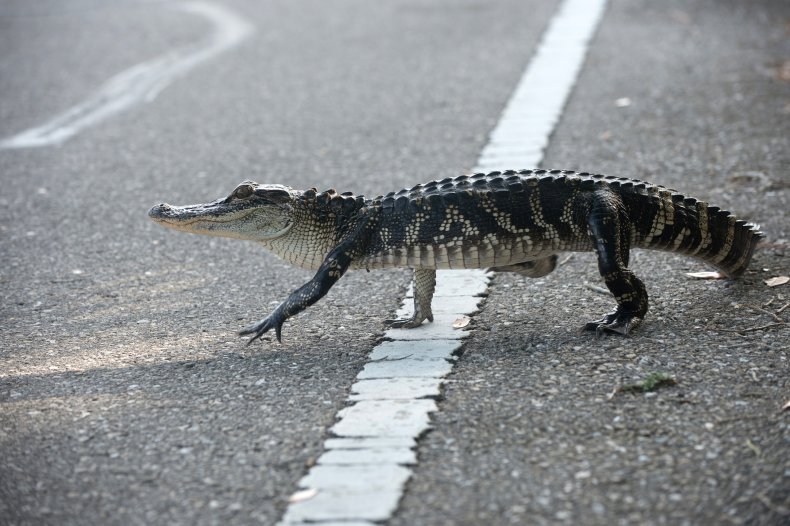'Aggressive' 400lb Alligator Getting Too Close to Children Playing Captured
Officers went beyond the call of duty when they helped remove a 400-pound alligator from a city pond in St. Petersburg, Florida.
The alligator was 10 feet long and had been causing concern among the local residents for some time.
The incident was shared by the St. Petersburg Police Department to their Facebook page in a post on March 16 which said that the alligator had been coming "too close to kids playing in the area and wasn't afraid of people."

"As we understand, it tended to approach the shoreline when it heard the sound of neighborhood children and pets," Ken Knight, a spokesperson for the St. Petersburg Police Department, told Newsweek. "Neighborhood residents were concerned about its aggressive nature toward children and pets."
A trapper was called in to remove the alligator on March 16, and the local police force attended the scene to assist the trapper. "They helped him locate the gator in the water when it surfaced," Knight said. "They assisted the trapper through the process of hooking, dragging it to shore and capturing it."
Florida is home to over 1.3 million alligators, according to the state's Fish and Wildlife Conservation Commission. They are mostly found in swamps, marshes, rivers and wetlands, but at this time of year they often come into residential areas looking for food and a mate.
The average size for an American alligator, as estimated by the Smithsonian's National Zoo, is 8.2 feet for a female and 11.2 feet for a male, so this one was on the larger side. Any gator over 4 feet can pose a threat to people, pets and property.
As the weather starts to warm up, alligators become more active, and also more aggressive, as they begin to look for a mate.

"We're not quite in breeding season yet, but we're right on the edge of it," alligator wrangler Todd Hardwick, who owns the wildlife control company Pesky Critters, previously told Newsweek. "We're in the time of year where the gators are starting to roam around and climb out of the river or canals and take a shortcut through neighborhoods and on roadways."
As a result, reports of alligators in residential areas have increased in recent weeks.
If you ever see an alligator in your neighborhood you should give it a wide berth and call in a professional to have it removed. If you have a dog, you should keep it away from bodies of water and avoid areas of heavy, swampy vegetation.
"And above all, don't feed the alligators," Hardwick said. "Once you start feeding them, you condition them to come up to people, and that's when they become dangerous."

